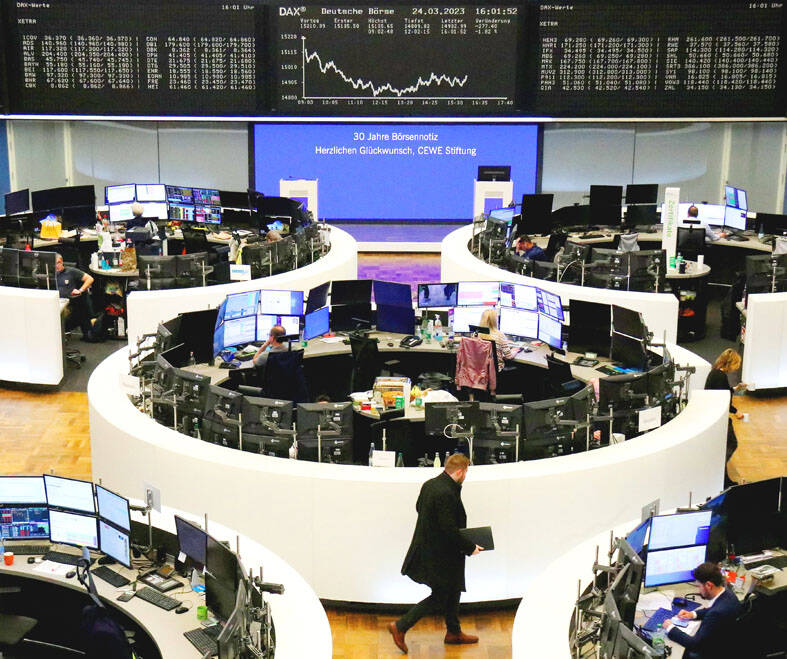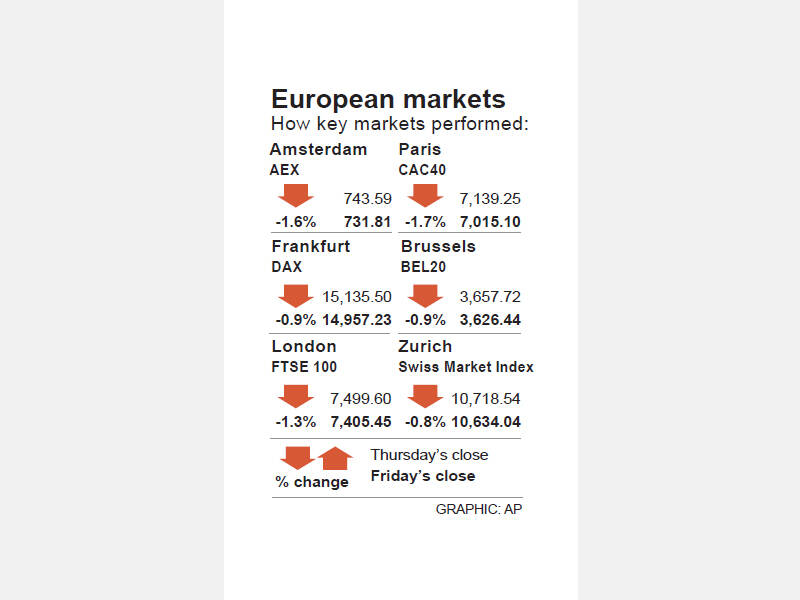Bank and financial services stocks dragged European markets lower on Friday as concerns remained about the health of the sector, with news of a US probe into Credit Suisse AG and UBS Group AG piling more pressure on the stocks.
The pan-European STOXX 600 index fell 1.4 percent to 440.11 points, but gained 0.9 percent over the past five sessions due to a sharp recovery early in the week.
In the UK, the FTSE 100 lost 1.3 percent to 7,405.45 points, after gaining 1 percent over the week, while the domestically focused FTSE 250 also shed 1.3 percent on Friday, reversing most of its gains over the week and closing down 0.1 percent from Friday last week.

Photo: Reuters
Shares of Swiss banks Credit Suisse and UBS fell 6.4 percent and 6.3 percent respectively, after reports that they are among the banks under scrutiny in a US Department of Justice probe into whether financial professionals helped Russian oligarchs evade sanctions.
Austria’s Raiffeisen Bank International slipped 1.8 percent after reports that the European Central Bank (ECB) is pressing it to unwind its highly profitable business in Russia.
Overall, European banks fell 2.3 percent, with Deutsche Bank down 5.4 percent after a sharp jump in the cost of insuring against the risk of default late the day before.

Financial services shares were down 1.5 percent.
German Chancellor Olaf Scholz said after an EU summit that “there is no reason to be concerned” about Deutsche Bank as the lender is “very profitable.”
ECB President Christine Lagarde told EU leaders that the eurozone’s banking sector is “resilient because it has strong capital and liquidity positions,” an EU official said.
However, City Index analyst Fiona Cincotta said that the sell-off in bank shares has highlighted “just how fragile sentiment is towards the sector.”
“As central banks continued hiking rates this week, the outlook is looking increasingly shaky,” she said, adding that “Deutsche Bank has come under the spotlight as a possible target for contagion risk.”
Additional reporting by Staff Writer

Semiconductor shares in China surged yesterday after Reuters reported the US had ordered chipmaking giant Taiwan Semiconductor Manufacturing Co (TSMC, 台積電) to halt shipments of advanced chips to Chinese customers, which investors believe could accelerate Beijing’s self-reliance efforts. TSMC yesterday started to suspend shipments of certain sophisticated chips to some Chinese clients after receiving a letter from the US Department of Commerce imposing export restrictions on those products, Reuters reported on Sunday, citing an unnamed source. The US imposed export restrictions on TSMC’s 7-nanometer or more advanced designs, Reuters reported. Investors figured that would encourage authorities to support China’s industry and bought shares

FLEXIBLE: Taiwan can develop its own ground station equipment, and has highly competitive manufacturers and suppliers with diversified production, the MOEA said The Ministry of Economic Affairs (MOEA) yesterday disputed reports that suppliers to US-based Space Exploration Technologies Corp (SpaceX) had been asked to move production out of Taiwan. Reuters had reported on Tuesday last week that Elon Musk-owned SpaceX had asked their manufacturers to produce outside of Taiwan given geopolitical risks and that at least one Taiwanese supplier had been pushed to relocate production to Vietnam. SpaceX’s requests place a renewed focus on the contentious relationship Musk has had with Taiwan, especially after he said last year that Taiwan is an “integral part” of China, sparking sharp criticism from Taiwanese authorities. The ministry said

US President Joe Biden’s administration is racing to complete CHIPS and Science Act agreements with companies such as Intel Corp and Samsung Electronics Co, aiming to shore up one of its signature initiatives before US president-elect Donald Trump enters the White House. The US Department of Commerce has allocated more than 90 percent of the US$39 billion in grants under the act, a landmark law enacted in 2022 designed to rebuild the domestic chip industry. However, the agency has only announced one binding agreement so far. The next two months would prove critical for more than 20 companies still in the process

CHANGING JAPAN: Nvidia-powered AI services over cellular networks ‘will result in an artificial intelligence grid that runs across Japan,’ Nvidia’s Jensen Huang said Softbank Group Corp would be the first to build a supercomputer with chips using Nvidia Corp’s new Blackwell design, a demonstration of the Japanese company’s ambitions to catch up on artificial intelligence (AI). The group’s telecom unit, Softbank Corp, plans to build Japan’s most powerful AI supercomputer to support local services, it said. That computer would be based on Nvidia’s DGX B200 product, which combines computer processors with so-called AI accelerator chips. A follow-up effort will feature Grace Blackwell, a more advanced version, the company said. The announcement indicates that Softbank Group, which until early 2019 owned 4.9 percent of Nvidia, has secured a